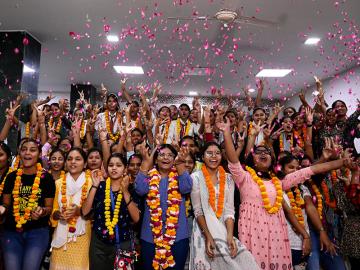Creating an future-ready workforce in India
It has become crucial for authorities and institutes to instil creative thinking in sync with technology in the future workforce
In order to improve employability and prepare students for the workforce of the future, higher education institutes can also look at inviting industry leaders to classrooms to give one-on-one experience and ease them into what is expected from the workforce
Image: Shutterstock
Rewinding to the pre Covid-19 times, countless companies assumed that not all jobs can be carried out without being physically present in the office. However, since the pandemic has enforced the unexpected circumstances, many offices have made deliberate efforts to develop a culture and environment that are remote work friendly. In the middle of a profound transformation, social and economic scenarios have been accelerated by advancements in automation and artificial intelligence, and exceptional access to data and computation.
In order to improve employability and prepare students for the workforce of the future, higher education institutes can also look at inviting industry leaders to classrooms to give one-on-one experience and ease them into what is expected from the workforce. Employers these days are in search of graduates with problem solving skills and critical thinking that college leaders and their faculties consistently rank among the most important goals of an undergraduate education. The increasing graduation rates accomplish little if students do not learn something of lasting value. Hence, it becomes imperative for imhigher education institutes to focus on the improvement of quality of education. Here are some factors that depict the correlation between higher education and work:
Changing work culture:
As people are adapting to the new norms and the changes that occurred across geographies, one of the key challenge was to gradually re-enter the workspace with regards to optimum productivity along with optimum workplace stability. Re-designing the workplace and building a culture of continuous learning needs to be implemented with a top-down approach, where flexibility is the key for employers as well as employees. Even the leadership could initiate a discussion about new ideas and new approach towards grasping new techniques. Simultaneously, new learnings and fostering a flexible, innovative spirit could become a collaborative future process.Skill optimisation:
In these challenging times, companies would be primarily focusing on talent and skill optimisation. Organisations will have to delegate brand ambassadors and marketers to interest fresh talent as well as retain incumbents. Initiatives like employee engagement strategies, learning techniques and enhancing the experience of the present employees will provide other avenues for employers to hold their top talent and engage and set examples for the new recruits.Building/maintaining work-life balance:
Since the pandemic struck the corporate world has shifted its focus from promoting a ‘work-centred’ culture to a more sensitive ‘life-centred’ mind set. The reality is that ‘work’ will always be a part or our ‘lives’. Companies and organisations have become more conscious of the social and emotional aspects of life that cater to the social needs of their employees. For instance, the hybrid work from home set up has forced people to mindfully follow and understand these aspects which has made it is possible to get work done remotely. With the offices slowly reopening, recruiters can expect the pressure to maintain this flexibility, particularly from employees who are also caregivers of children, the elderly, or of loved ones who are unwell. It is proven that work can be done on separate schedules that best suit the preference and personal commitments of employees.The amalgamation of cognitive thinking and technological aid:
Students found the sudden transformation from offline to online classrooms difficult to cope with. Initially, there were regarding the quality of online education, as they were uncertain about what lies ahead. Engaging with instructors and fellow students virtually and coping with academics and building social skills with technology as a medium were major challenges. But, what they didn’t realise were its advantages—availability, accessibility, convenience, and flexibility. Eventually, transforming ways of learning and prioritising different skill set became the solution. The unprecedented circumstances forcefully brought the world to terms with technology-based learning and work settings. Gradually, people understood the need and applicability of learning with technology and its feasibility.While challenges are ongoing, this unprecedented situation has transformed the entire education and work ecosystem with an abundance of opportunities to innovate and learn from it. The ultimate solution to work in synch with both cultures is the ability to learn and adapt swiftly. The ripples of the ongoing pandemic has impacted all perspectives of the spectrum. With hybrid work culture becoming the new normal, the education system needs to re-invent into a progressively digitised and flexible ecosystem that builds employees for the future workplace.
Prof. Dr. Uday Salunkhe, Group Director, S.P. Mandali’s Welingkar Institute of Management Development and Research (WeSchool)
Check out our Festive offers upto Rs.1000/- off website prices on subscriptions + Gift card worth Rs 500/- from Eatbetterco.com. Click here to know more.
[This article has been reproduced with permission from Welingkar Institute of Management Development and Research (WeSchool)]














